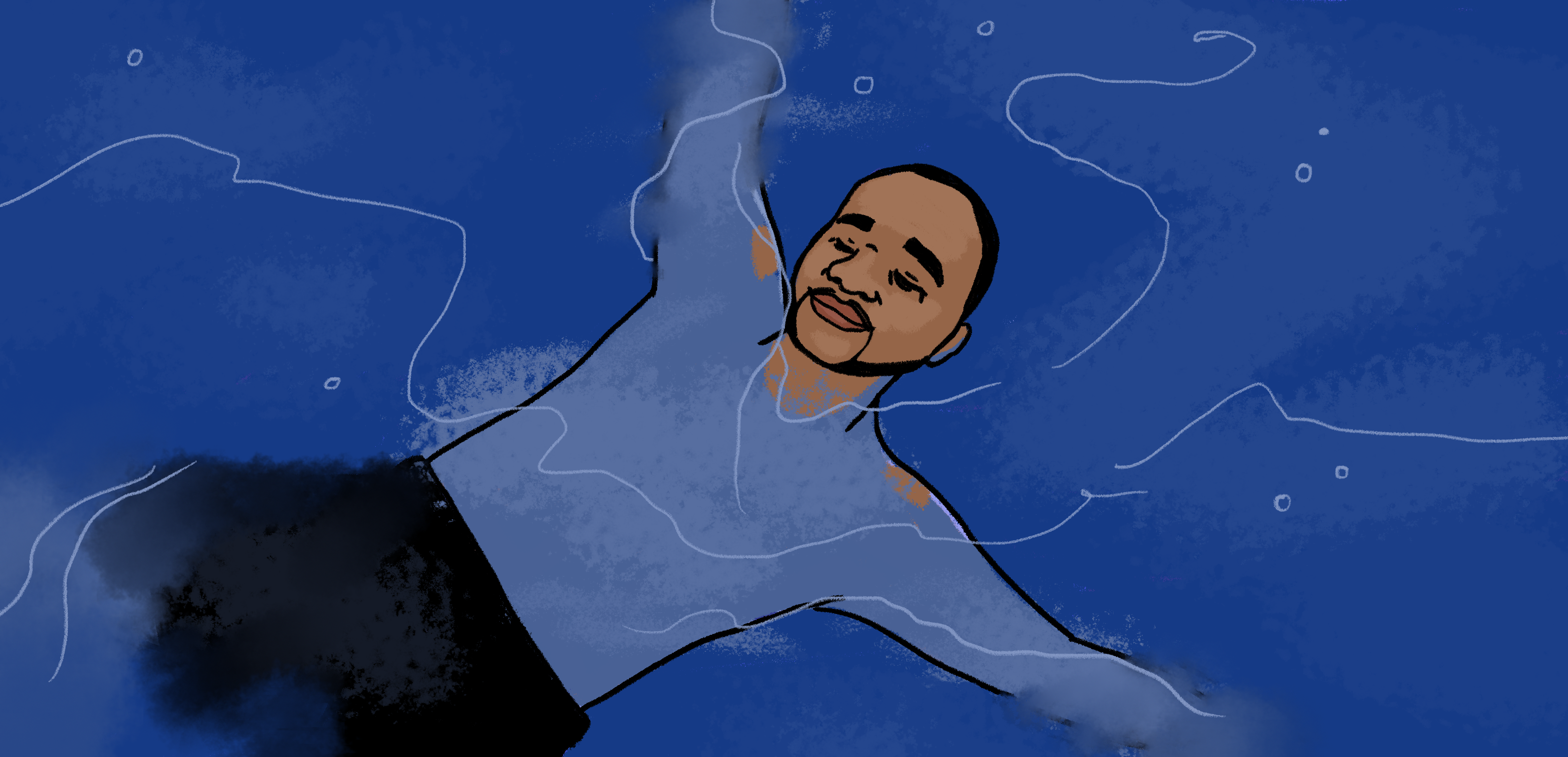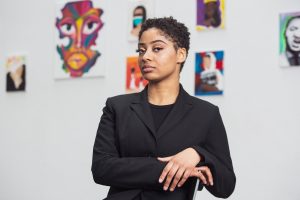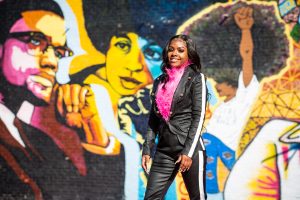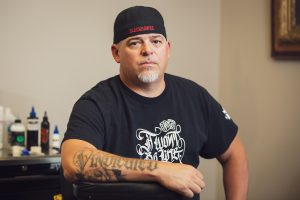Libyans sometimes refer to being arrested and taken away without warning as being “taken behind the sun.” This interview series celebrates — through conversations with currently and formerly incarcerated artists — the ways in which an artistic, creative life can transmute the impact and redefine the legacy of an experience within the Prison Industrial Complex.
I first learned about Brandon Wyatt when we were both awarded commissions as part of the Illinois Humanities Envisioning Justice Initiative. Brandon is a writer who explores everything from his favorite cultural influences to his journey with self-improvement through prose, all against the backdrop of a 42-year sentence. We spoke by phone about how Brandon confronts the hypermasculinity of prison, the paradox of needing to “get smaller” in order to grow, and how sometimes even Family Guy can be a doorway to joy.
Michael Fischer: Let’s talk about what you’ve called the “sensual atrophy” of prison. In terms of the sensory palate, obviously prison offers little to nothing: ugly colors, not much visual stimuli, bad smells. You’ve talked about needing to generate a “self-created pool of muses.” Walk me through that process.
Brandon Wyatt: I think it starts with doing exercises, or even just creating “distractions” that isolate or maybe even enhance your imagination. Let’s say for example: it’s a common thing in prison where our taste buds have been dulled, if you will. We are not experiencing cuisine or culinary art at its highest. The food is bland and you only have access to processed foods. You have to almost tap into either your previous memories of what certain foods taste like, or you have to drum up a creative imagination: when you’re watching a cooking show, what does that taste like? What does pure garlic taste like?
Particularly if you’re trying to transcend this present, concrete, inadequate environment, everything becomes just you, going into your own recesses of your mind and imagination to create—whether it be tastes, colors, certain sights, sounds. I commented to someone yesterday: we don’t hear sirens that much in prison. So on the off chance that you hear a siren—whether that be police, ambulance—it sticks with you, and you start to imagine, “I wonder where that’s going, what is it for?”
All these things show you on a daily basis the demand of maintaining a healthy and even a robust or just full and enriched imagination and creativity. Just to combat the sensory deprivation—we do it unconsciously, it’s almost a subconscious exercise. But what we’re conscious of is you intentionally look for images, you intentionally look for programs. You try to listen for sounds that distinguish themselves from the norm or distinguish themselves from the mundane.
MF: Any men’s prison is an atmosphere of pervasive, stereotypically masculine energy. How does that affect your creative process, and how do you find ways to tap into the feminine despite your environment?
BW: It certainly is a challenge, where you are overwhelmed. It’s one thing to say masculinity; it’s another to say hypermasculinity. I think if this was an environment that had a basic level or even just a subtle difference in the amount and ratio of feminine to masculine, you could understand that. Almost like if you’re in a room watching a sports game; you would imagine that there would probably be a few more men than women, but for the most part there is some semblance of feminine energy.
In these types of institutions, in these types of circles and sects, you have a disproportionate—and, like I said, it becomes a hypermasculine culture. Creativity does not thrive, it does not function well, in any environment that is over or beyond the norm, where it doesn’t become a matter of degrees but it almost becomes distorted, if you will.
The challenge for me is to find avenues or even just to remove myself individually and personally from the temptation to… sometimes you get caught up with trying to match masculine with masculine: “Hey, I have to approach this environment from an assertive, maybe even aggressive perspective.” You have to challenge yourself not to try to bring resolution through this “fire with fire.” It becomes a personal challenge to seek out what we may deem to be more feminine perspectives, more feminine expressions. You just have to almost will yourself into these forums and these expressions.
It helps to have women in your life who you can talk to, or just seek out what we deem to be softer, gentler interests and just yield to it. To say, “Hey, I can be in prison, in an all-male institution, but still be concerned about how certain colors affect me or I can still be concerned about certain arts and aesthetics. I am not in violation of my manhood by looking to this or accepting this reality.” Beauty does have a place in the realm of our existence.
MF: We’ve spoken before about the challenge of creating while not exposed to much of what you call “right-brain energy.” Can you talk about what you mean by right-brain energy and how you confront that challenge?
BW: I always look at it from a sense of harmony. Left-brain is more where you have a tendency to distinguish things one from another; you have a tendency to be more concrete, more analytical, more intellectual. Right-brain is more instinctive, where you’re more in tune with feelings. To give you an off-hand example: you’re appreciating movies not just from some crude plotline or some witty line that an actor or an actress says, but you’re appreciating the camera angles. You’re appreciating the colors, the costumes, the effects.
That’s beneficial just in life in general, when you are able to apply this certain eye and perspective. It allows you to see beyond the superficial and the obvious. For all intents and purposes, you become a little more sensitive to the nuance—and it translates to social interactions. You’re able to talk to someone and you’re able to read body language. No matter what they say out of their mouth, you’re able to read their lack of eye contact. You’re able to read their body language and deduce certain conclusions from this.
This is all about being in that rhythmic, elevated, dare I say even poetic way of living. This is some of the essence of this right-brain mentality—being a little more right-brain, even in a sea of concrete and a sea of basic, day-to-day, superficial life.
MF: As an Envisioning Justice fellow, you recently collaborated with artist Alexandra Antoine on the project “Our Agreements.” Talk about what it’s like to work on a creative project with a collaborator who’s on the outside, and how you negotiated that process.
BW: At first glance I thought that it would be rather difficult, due to the constraints of being in prison—whether it be communication, like, nothing is in real time except phone calls. I thought there would have to be a steady back-and-forth, like if I present an idea. Or me not having a full understanding, or not being there in person to see how it would be executed.
To my surprise, it was rather seamless. I was surprised at how we were able to navigate through. Obviously, when you’re prepared—I always value the importance of being prepared. When you’re prepared for something and you’re prepared for these types of get-togethers and these types of combinations, it makes a world of difference. We were able to accomplish a lot over the phone, just kind of subtle nudges and interactions. We were able to make certain recordings about certain chapters. So I really didn’t find that prison created just a wall. You would think prison is just walls and gates literally, but figuratively there was not a wall in this combination of just two artistic people coming together.
All the credit to her as well, where she was able to bend and shape scheduling and opportunities. It wasn’t that difficult—not even from a logistical standpoint or even mentally. It seemed to be fairly easy and it flowed. There was a fluidity to it and I’m appreciative of her will, and mine as well, to come together and make it work.
MF: It was a great project; I hope people will go check it out after they listen to this. In introducing and framing “Our Agreements,” you wrote that the project is “asking each other to go deeper internally and sharing our thoughts with the rest of the world, honoring each individual as a creative force.” I’m curious, in your ideal world, what does that look like—to honor each individual as a creative force?
BW: I think that the crux and essence of it is just to acknowledge potentiality. Everyone has the potential. If you want to be technical about it then yeah, there are some people with certain biological deficiencies. But if you just say strictly from a hardware perspective: everyone has billions of neurons, everyone has, on average, the intellectual capacity, or everyone has the same apparatus, brain/mind, to produce a variety of outcomes and possibilities.
It’s almost like as a child, they give you the book where you can pick your ending: “Hey, if you think Jim should jump over the bridge, go to page ten!” Life is like that. Just to respect everyone’s ability to be their own decision-maker and forge their own path.
That doesn’t happen easily. We have this egotistical or even arrogant perspective that everyone should conform and fit in a box or category that we put them in. When you take a step back and say, “I honor you for your infinite possibilities, and I hope that you take these infinite possibilities and go in the best possible direction, or that you adhere to a harmony of not only yourself but the people around you.” And you’d be surprised at just how accepting and how comfortable you are with developments, and specifically people. Just understanding behavior.
Everyone has this divine spark, everyone has these gifts and talents—maybe not to the same degree, but in essence and quality, everyone has the same creativeness in them. It’s all about me yielding to that fact and not wanting to impose my will, not wanting to impose my beliefs or opinions on anyone else.
MF: A lot of your writing does any or all of three things in any given piece: focuses on your cultural influences, draws connections throughout history, and takes a humanistic perspective. Can you talk about why each of those three components is so important to you and the work that you’re creating?
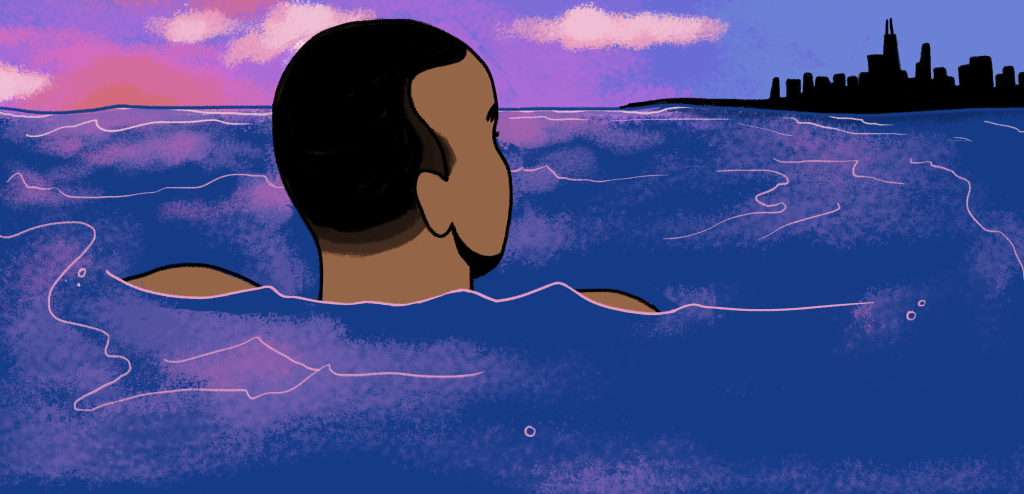
BW: First off, with cultural influences: in any situation, I don’t think that we can go into any social circumstance that we don’t see the influence of a particular culture that has molded the way that the dynamics or the functioning of that particular environment or social setting adheres to. Even if you don’t think there’s a culture, even if it’s chaos, then hey, it’s a culture of chaos. To address the underlying reality, that is so important for a person’s understanding: “Do I fit in this social standing? Because this doesn’t comport with what I deem to be a righteous culture.”
It’s so important for any artistic or academic investigation or examination, is to look at “what is the culture of this?” You naturally do this by your second point, of the historical element: how did this culture get to where it is? What were the developments that changed a particular culture? What were the events, who were the people involved?
It’s like an exercise that a teacher once taught me: the five why’s. Any time you have a question, you ask “why?” to the first answer, and then you ask “why?” to the next one. And you go beneath the basic, simple answer and solution. You take it a few layers deep by going deeper into even something simple, like why is America a capitalist society? Once you start going a little bit deeper, you’d be surprised at the roots and the influence of Europe and Britain and things of the such. The historical element of it is important as well—and I don’t think any legitimate assessment of any person, being, environment, or circumstance should be devoid of a historical view. What was the third element?
MF: Taking a humanistic perspective.
BW: This is probably my favorite: taking a humanistic perspective. Because it all starts with us as individuals. It’s almost like the Descartes truism. Let me see if I can quote it right: “I think therefore I am.” You, in being a person, are the beginning of existence. If a tree falls in the woods and no one hears it, does it make a sound?
Everything starts with us as an individual—us as being the most elevated, most evolved beings on the face of the Earth. It all determines and rotates around how are you perceiving, how are you responding, how are you absorbing what goes around you? Just placing the value on a person as being the foremost entity on this physical plane.
If you notice, the other two perspectives make reference to this humanistic perspective. Hey, what is the culture that the person is set in? What is the history that led up to this person’s existence? Just to do a thorough look at any event or creation, it has to be infused with those three—but particularly the fact that you have to have a legitimate respect and even submission to what is the humanistic perspective of it, and do so without arrogance. You can be bold in that perspective, believing that everything springs from inward to outward.
MF: You recently urged me in an email to “cherish and generate a special amount of ‘space,’ both actual and abstract, that affords you the room to grow, gather, and be guided by your own internal direction.” Which made me wonder: over the years, have you been able to carve out that kind of space for yourself—at least mentally—and if so, how were you able to do that?
BW: Was that a philosopher who wrote you that? Who wrote you that? But no, in all seriousness, it’s hard. That is an everyday struggle. It’s almost on a macro level. That’s one thing they talk about that the world doesn’t have: the world can’t create more land. As much as we have iPhones, smartphones that are probably more technologically advanced than the rocket ships back in the 60s and 70s, we can’t create land. That is a metaphor for just how hard it is to create this space that you speak of.
Even going back to the humanistic standpoint: even in the confines of a cell that has a few feet of length and a few feet of width, you have to make yourself even smaller. That’s a paradox if there ever was one: you have to make yourself smaller to make space. You have to resist external distractions. You have to resist even your own ego or your own inflated sense of self, and make yourself so small. Only then do you have the space to entertain these lofty or noble concepts of peace, of what’s true, like what does love look like?
To put a description on it, it’s almost like an ant. If I was to tell an ant, “You have this whole cell to yourself,” an ant would be like, “Woo, look at all this space!” As opposed to someone such as myself; I’m like, “This is a broom closet.” But this is how you have to make yourself, spiritually and morally, and maybe even creatively. And that goes against the essence of creativity being expansion and evolving—but you have to make yourself small.
It’s basically a removal of burdens, of confusion, of disorientation. Remove all these. Only then can you start to have this expanse of thought, of identity, of purpose. It’s mainly making yourself small, that would be the best description or best how-to guide to create the necessary space.
MF: I think that paradox is really powerful. I want to end on a hopeful note, talking about joy. Our previous phone calls have left me wondering what role joy plays in your daily life, and especially in your creative work. I’m a big believer that remaining playful and joyful in an awful environment is its own form of protest, but I imagine that it’s also key for your creative work.
BW: I’ve noticed that I don’t have the same creative blocks, mentally, when I am free and loose. I’m going to give you an example. One of my favorite shows to get in that space is Family Guy. Family Guy can be abrasive; it has certain racist hints, tones, sexist, cultural, and so on. To the average person, it may seem like a crude example of art, or just cartoons or entertainment. But when you get in that space of not having inhibitions, when you get in that space of not being defensive—like, I watch it and I’m able to laugh. And even if I cringe a little bit, it’s not from a defensive standpoint.
There’s something about being in that space and being able to laugh, being jovial, being lighthearted. You are able to be a little bit freer and fluid, like water. If you think about the nature of water: water traverses, it takes different shapes. It doesn’t put up much resistance. It says, “Hey, I’ll go wherever you put me.” Creatively, when you allow yourself to take that artistic form, creative form—and even just socially, if you’re able to be flexible, you’d be surprised at the circles and the networks that you can create from that.
Just being “with the innocence of a child.” That doesn’t mean that you’re childish or that you’re immature, but you don’t have these hang-ups; you don’t have these defense mechanisms. You’re able to project this infinity or this boundless energy that everyone has, I would say from the day of their birth, but even before birth. You have this divine will, this divine consciousness, this divine energy. It’s only able to come through when you’re able to remove those layers of so-called adulthood.
Be loose, be joyful, be able to laugh at yourself. For the most part, be able to laugh at others; be able to smile. These things are beneficial health-wise, whether it be endorphins, whether it be just releasing other neurotransmitters and the chemistry of the brain. But also, it attracts. No one is attracted to a sourpuss. So you’re able to attract others. You’re able to attract other peoples’ creative energy through joy, as opposed to through pain and being mean and sorrowful.
I find that it’s more so a weapon—weapon may not be the optimal word, but it’s a tool or an instrument. Joy is a tool and an instrument to create and generate opportunities for creativity, and creativity certainly opens up doors and pathways for just about everything in your life.
MF: Is there anything else that you want to speak on or say, any shoutouts you want to give before we run out of time?
BW: I want to thank all the people up to this point who, whether directly or indirectly, consciously or subconsciously, have contributed to my evolution—my steady climb towards one of my favorite words in the English language: transcendence. Helping me transcend not only the circumstances but the desires and fears that come with being in prison. Whether it be my family, friends, loved ones—everyone knows who they are.
I think it’s incumbent on anyone listening that they understand, using the W.E.B Du Bois quote—he was in Harvard and he said, “Although I’m in Harvard, I’m not of Harvard.” Being able to tap into those creative energies, while I’m in prison, I may not be of prison. I’m always looking for what is beyond these walls, beyond this concrete, beyond this culture.
That is the substance with which we should measure individuals who are in these circumstances. That is the measuring stick; that is the standard for how we should view people. What are they doing to transcend, or are they in a transcendent place—not only morally, not only educationally? Where are they, and even for the sake of this conversation, how are they applying their creativity to transcend some of the circumstances that led them there?
Outside of that, this was a joy and a pleasure to have this dialogue and this question and answer session, and I appreciate you Michael, I do.
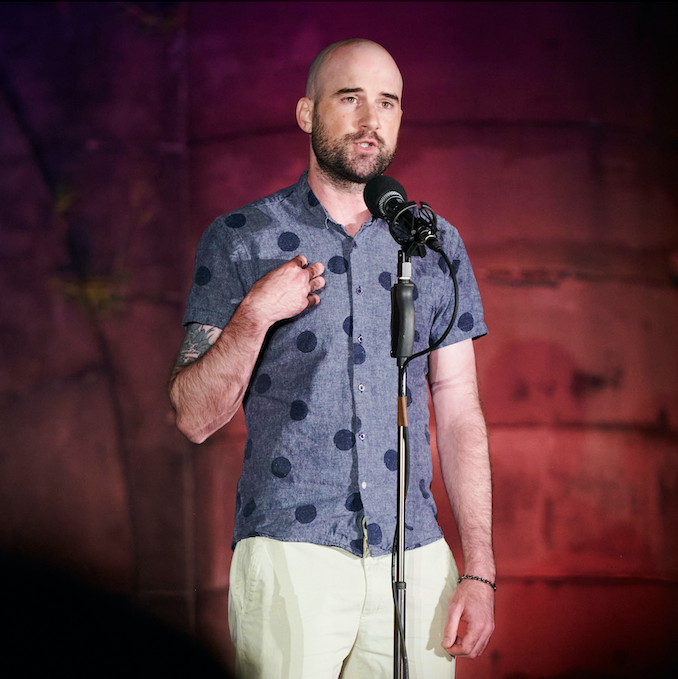
About the Author: Michael Fischer was released from prison in 2015 and is currently a humanities instructor in the Odyssey Project, a free college credit program for income-eligible adults. He’s an Illinois Humanities Envisioning Justice commissioned humanist, Luminarts Cultural Foundation fellow, Illinois Arts Council grantee, and a finalist for the PEN America Writing for Justice Fellowship. His nonfiction appears in The New York Times, Salon, The Sun, Lit Hub, Guernica, The Rumpus, and elsewhere, and he’s been featured on the Outside Magazine Podcast, The New York Times‘s Modern Love: The Podcast, and The Moth Radio Hour.
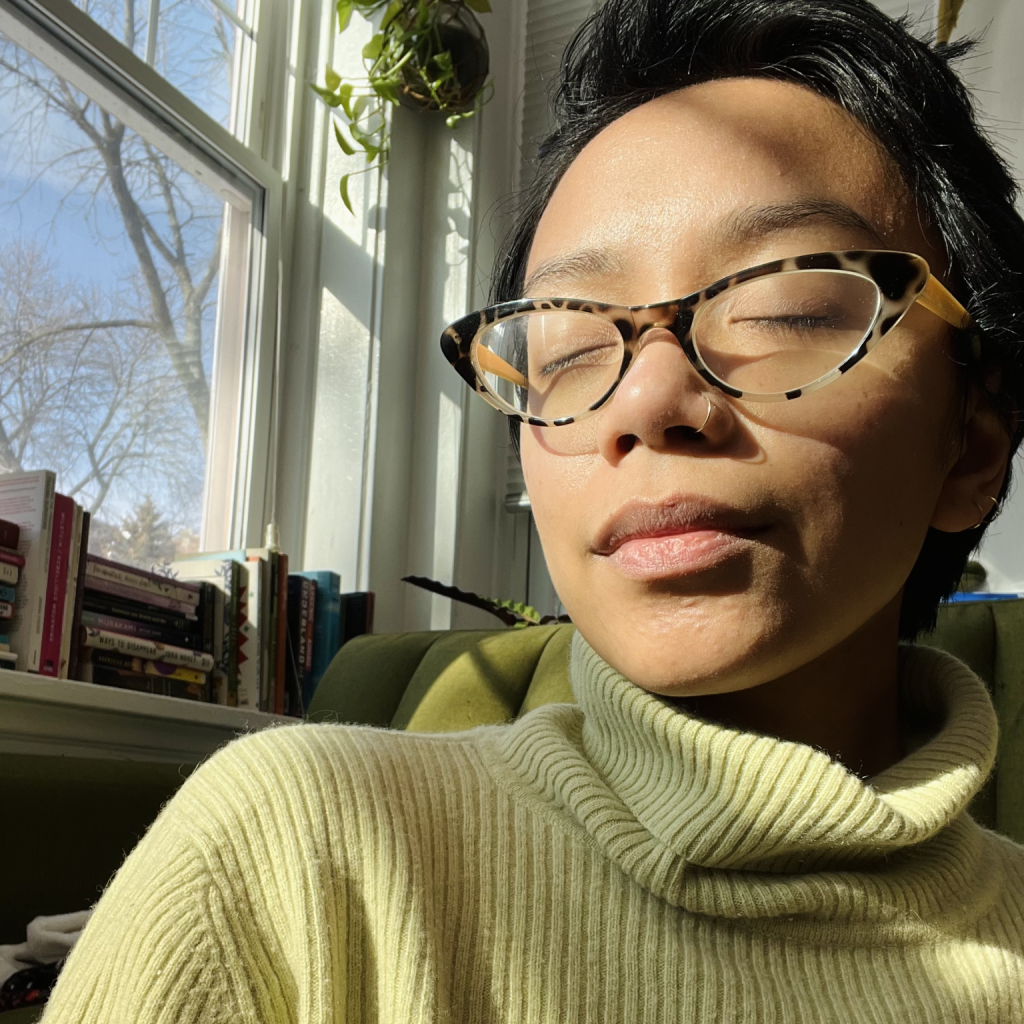
About the Illustrator: Peregrine Bermas is a creative and curious earthling living in their birthplace, so-called chicago. Their practices include illustration, ritual, somatics and herbology. As a community herbalist, Peregrine is passionate about holding space for remembrance of ancestral, kitchen-accessible and bioregional medicine.
